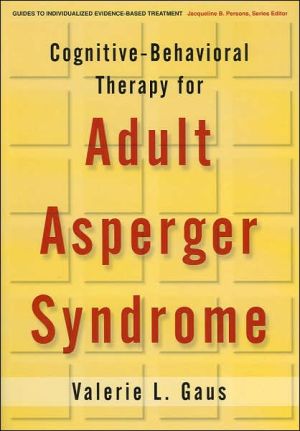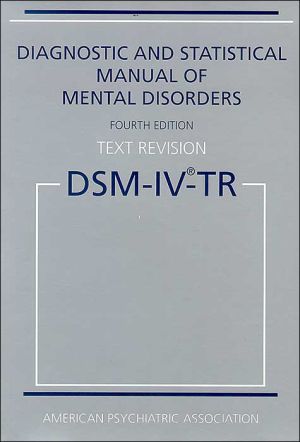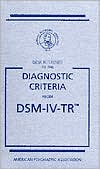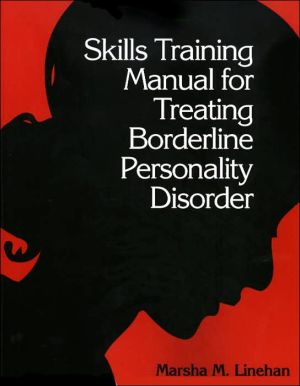Cognitive-Behavioral Therapy for Adult Asperger Syndrome
An invaluable resource for therapists, this lucidly written book provides research-based strategies for addressing the core problems of Asperger syndrome (AS) and helping clients manage frequently encountered comorbidities, such as anxiety disorders and depression. Detailed case examples illustrate the complexities of AS and the challenges it presents in daily life, relationships, and the workplace. The author presents a cogent rationale for cognitive-behavioral intervention and offers clear...
Search in google:
An invaluable resource for therapists, this lucidly written book provides research-based strategies for addressing the core problems of Asperger syndrome (AS) and helping clients manage frequently encountered comorbidities, such as anxiety disorders and depression. Detailed case examples illustrate the complexities of AS and the challenges it presents in daily life, relationships, and the workplace. The author presents a cogent rationale for cognitive-behavioral intervention and offers clear guidelines for conducting assessments and designing and implementing individualized treatment plans. Throughout, the emphasis is on helping people with AS decrease distress while preserving and building on their unique strengths. Special features include a case formulation worksheet and other helpful reproducibles. PsychCentral.com "Valerie Gaus has made a major contribution....She provides a practical overview of diagnostic cues as well as guidelines for evidence-based therapy....She has developed a comprehensive and effective model for intervening with adults with AS. Using case studies from her many years of research and practice, she offers the practicing clinician a readable and helpful window into work with this challenging population....Gaus'' frequent use of transcriptions of parts of sessions, anecdotes, and multiple case examples illustrate her ideas and keep us engaged....A readable and fascinating journey into the lives of those with AS and an opportunity to see an expert clinician at work. While it is targeted to the practicing mental health clinician, the book would also be helpful to others who work with and relate to people with AS, including co-workers and supervisors, family members, and romantic partners. Clients with AS who are distrustful of authority or who are discouraged about therapy may find it an encouraging and exceptionally practical means of self-help."--PsychCentral.com
Introduction 1The Book's Intended Audience 1Terminology 2Mental Health Needs of Adults with Asperger Syndrome 3Removing Barriers and Bridging Gaps 4Origins of My Ideas 4A Philosophy of Change 11Defining Asperger Syndrome in Adulthood 13What Is Asperger Syndrome? 13How Does Asperger Syndrome Present in Adulthood? 15Understanding the Symptom Picture in Adults with Asperger Syndrome 28Strengths and Assets 36Chapter Summary and Conclusions 38Conceptualization of Mental Health Problems in Adult Asperger Syndrome 39General Conceptual Model 39Core Cognitive Dysfunction in Asperger Syndrome 43Cognitive Dysfunction and Risk for Mental Health Problems 60CBT for Asperger Syndrome 65Chapter Summary and Conclusions 66The Initial Assessment 67Intake Issues 67Diagnosis and Definition of Target Problems 79Chapter Summary and Conclusions 96Individualized Case Formulation and Treatment Plan 99Case Formulation 99Treatment Plan 109Chapter Summary and Conclusions 119Psychoeducation and Orientation to Treatment 120Psychoeducation 120Orientation to Treatment 124Chapter Summary and Conclusions 131Intervention: Increasing Skills to Address the Core Problems of Asperger Syndrome 132Review of Nomothetic Formulation 132"Habilitation" for Core Problems 133Increasing Social Skills 135Increasing Coping Skills 152Chapter Summary and Conclusions 161Intervention: Addressing Comorbid Mental Health Problems 162Introducing the Cognitive Model to the Patient 164Identifying and Responding to Dysfunctional Automatic Thoughts 169Recognizing and Modifying Intermediate Beliefs 177Modifying Schemas 186Chapter Summary and Conclusions 192Adjunctive Therapies and Interdisciplinary Collaboration 194Guidelines for Referral and Collaboration with Other Service Providers 194Adjunctive Services and Their Roles 196Chapter Summary and Conclusions 203Obstacles to Treatment and How to Address Them 204Social Interaction Difficulties as Challenges in the Psychotherapy Session 204Executive Function Problems Interfering with Homework Completion 207Low Motivation to Be in Treatment or Rejection of the Cognitive Model 208Family Issues That Interfere with Treatment 208Substance Abuse 209Isolation and Lack of Supports 210Financial Problems 210Untreated Health Problems 212Polypharmacy: Multiple Psychiatric Medications without a Rationale 213Lack of Cooperation from Other Providers 213Chapter Summary and Conclusions 214Ending Treatment and Looking Ahead 215When the Goals of Treatment Are Met 215When Treatment Is Interrupted before Goals Are Met 217Looking Ahead for Adults with Asperger Syndrome 220Concluding Comments 222Therapy Resources 223References 227Index 237
\ PsychCentral.com"Valerie Gaus has made a major contribution....She provides a practical overview of diagnostic cues as well as guidelines for evidence-based therapy....She has developed a comprehensive and effective model for intervening with adults with AS. Using case studies from her many years of research and practice, she offers the practicing clinician a readable and helpful window into work with this challenging population....Gaus' frequent use of transcriptions of parts of sessions, anecdotes, and multiple case examples illustrate her ideas and keep us engaged....A readable and fascinating journey into the lives of those with AS and an opportunity to see an expert clinician at work. While it is targeted to the practicing mental health clinician, the book would also be helpful to others who work with and relate to people with AS, including co-workers and supervisors, family members, and romantic partners. Clients with AS who are distrustful of authority or who are discouraged about therapy may find it an encouraging and exceptionally practical means of self-help."--PsychCentral.com\ \ \ \ \ From the Publisher"This book solidly captures the essence of the issues experienced by adults with Asperger syndrome (AS). It provides detailed information on cognitive-behavioral assessment and treatment strategies, including many case examples that both fascinate and teach. This is a 'must read' for any person working closely with adults with social learning challenges. While the book is targeted for mental health providers, it is informative and helpful for a range of adult care providers, including speech pathologists and parents. I do not know of any other book like it."--Michelle Garcia Winner, SLP, private practice, San Jose, California\ "Truly the first of its kind, this impressive book is an indispensable resource for psychologists and graduate students who work with adults with Asperger syndrome (AS). Gaus provides a comprehensive overview of the complex mental health needs of this often-misunderstood population, along with guidelines for evidence-based intervention. Utilizing examples from her own clinical practice to illustrate the process of cognitive-behavioral therapy (without oversimplifying it), Gaus shows how to effectively support people with AS in improving their quality of life."--Peter F. Gerhardt, EdD, President, Organization for Autism Research\ "Individuals with autism spectrum disorders--who face a social world in which rules and expectations appear to be crystal clear to everyone but themselves--frequently experience anxiety and depression. Both of these challenges are best addressed through CBT, yet, until now, few resources were available to guide practitioners in working with this population. This book is the beginning of the answer. Written in plain and practical language, this book is much needed and enormously helpful."--Ami Klin, PhD, Director, Autism Program, Yale Child Study Center, Yale University School of Medicine\ "Gaus provides an important service in showing how cognitive-behavioral therapy can be applied with a range of problems experienced by adults with Asperger syndrome (AS). Especially helpful are the chapters on intervention, which take readers step-by-step through CBT approaches for addressing the core problems of AS as well as comorbid mental health problems. The author’s extensive clinical experience and understanding of these clients is evident throughout. The intervention strategies are described in considerable detail, with helpful case examples and references for interested readers to follow up on. Therapists working with these challenging adult clients will find this book thought provoking, practical, and invaluable."--Gary B. Mesibov, PhD, Departments of Psychiatry and Psychology and Director, Division TEACHH, University of North Carolina at Chapel Hill\ \ \ \ PsychCentral.com"Valerie Gaus has made a major contribution....She provides a practical overview of diagnostic cues as well as guidelines for evidence-based therapy....She has developed a comprehensive and effective model for intervening with adults with AS. Using case studies from her many years of research and practice, she offers the practicing clinician a readable and helpful window into work with this challenging population....Gaus'' frequent use of transcriptions of parts of sessions, anecdotes, and multiple case examples illustrate her ideas and keep us engaged....A readable and fascinating journey into the lives of those with AS and an opportunity to see an expert clinician at work. While it is targeted to the practicing mental health clinician, the book would also be helpful to others who work with and relate to people with AS, including co-workers and supervisors, family members, and romantic partners. Clients with AS who are distrustful of authority or who are discouraged about therapy may find it an encouraging and exceptionally practical means of self-help."--PsychCentral.com\ \ \








